Did sonar cause unexplained whale deaths?
Scientists are investigating why 75 deep-water whales washed up on Scottish and Irish coasts during August and September.
Most are Cuvier's beaked whales, which are among the deepest-diving whales on the planet.
Experts said 45 badly decomposed beaked whales were washed up on Hebridean islands such as North and South Uist and Tiree, with another 22 stranded on the west coast of Ireland and one in Northern Ireland.
They said it was highly unlikely that the animals were killed by a natural phenomenon such as disease.
And the experts want to know whether increased military activity in the east Atlantic may have played a part in their deaths.
They said sounds, like sonar used to trace submarines, may frighten whales to the surface too quickly, leading them to suffer decompression sickness - or the bends - which is similar to the potentially fatal condition experienced by divers.
There are concerns that the whales being washed up are just the "tip of the iceberg" and hundreds could have died at sea.
The Royal Navy said it took its responsibilities "very seriously" and carried out avoidance actions "when at all possible" if whales were detected before or during sonar operations.
- Warning: The following content includes graphic images
What are Cuvier's beaked whales?
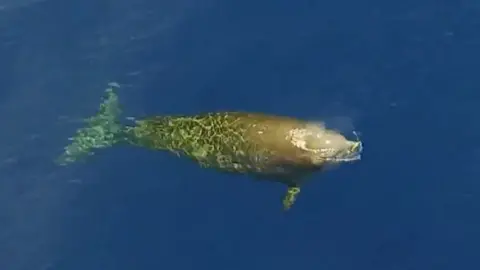 Sea Shepherd
Sea ShepherdDr Andrew Brownlow, from the Scottish Marine Animal Stranding Scheme (SMASS), said far less was known about Cuvier's beaked whales than other species.
"They are five or six metres long and they can weigh up to two tonnes but they are very secretive and very cryptic," he said.
They live off the edge of the continental shelf and dive down to great depths, up to two miles, and can spend more than two hours down in the deepest oceans.
What has been happening?
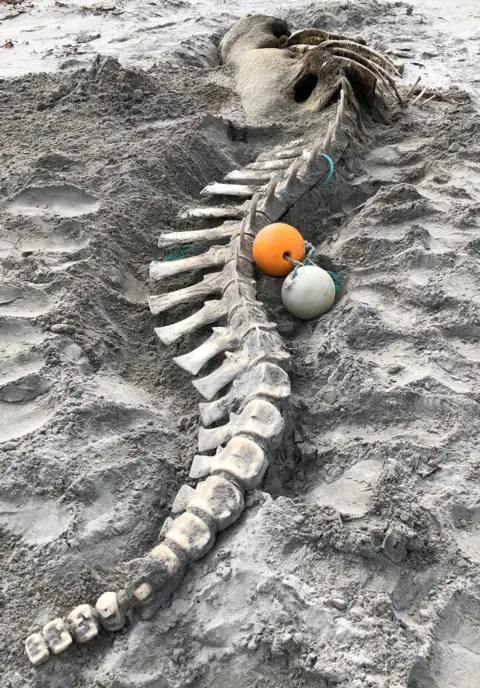 SMASS
SMASS
The first stranding alerts came from the west coast of Co Donegal and Co Mayo in Ireland at the beginning of August.
Irish researchers noticed specimens being washed up in badly decomposed conditions but still identifiable as beaked whales.
Soon after that cases began to be reported up the Atlantic seaboard of the Scottish coast, especially on islands such as the Uists and Tiree.
There have now been about 50 whales reported washed up on the Scottish coast and 20 in Ireland since the start of August.
Dr Brownlow said that was more in one month than in the past 10 years.
Where have they been stranded?
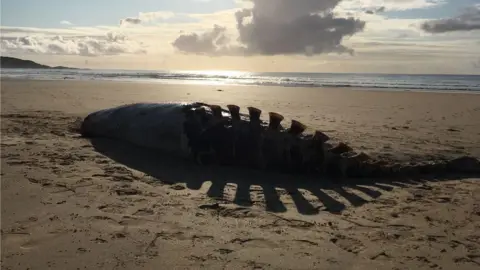 SMASS
SMASSThe Scottish Marine Animal Stranding Service (SMASS) has been collating the whale strandings on Scotland's west coast.
The largest number (about 22) have washed up on North and South Uist in the Western Isles.
But the small island of Tiree has seen at least nine strandings and nearby Coll has had two.
Islay, Mull, Ulva and places along the west Highland coast of the mainland have also experienced strandings.
Are the whale deaths being investigated?
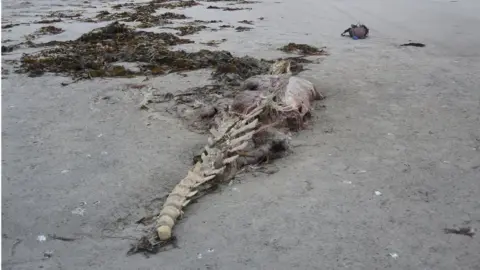 SMASS
SMASS
They are being investigated but the whales have been washed up in an extremely decomposed state, often just bones, so it is difficult to carry out any kind of a pathological post-mortem.
Dr Brownlow said his team would normally look for evidence of trauma or infectious disease but this was not possible in this case.
He said it would take a collaboration with lots of disciplines to get a "coherent picture" of what happened.
Could it be disease?
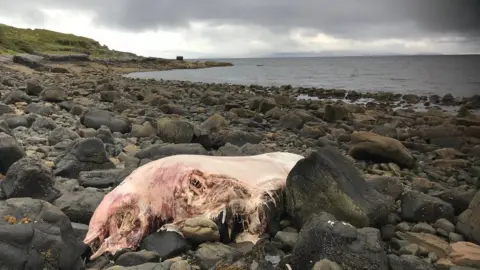 SMASS
SMASSDr Brownlow said the pattern of the strandings meant disease was an unlikely cause.
He said you would expect to see whales being washed up in different states of body condition and some would be ill when they were stranded.
The animals started off being relatively decomposed and then they moved on to being very decomposed.
"We think it's very much a focussed event that happened in terms of time and that doesn't fit the pattern of what we know about the disease process," he said.
Why is noise a problem?
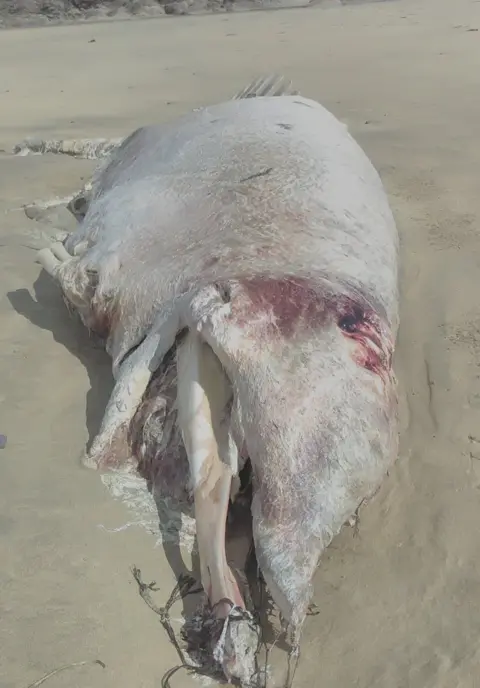 SMASS
SMASS
Dr Brownlow said whales have evolved over hundreds of thousands of years in an environment that has been quiet.
They use sound to be able to forage for food, to communicate and to navigate.
However, human activity over the past century has made the oceans much noisier and disrupted their behaviour.
Mass strandings of Cuvier's beaked whales often result from offshore human activities. Most regularly, due to active sonar used by military forces to locate submarines.
Dr Brownlow said: "In particular we know these animals are sensitive to what's called mid-range sonar, these are between about one and 10 kilohertz, which is used quite extensively by the military to navigate and find other craft."
He said the noise can change their behaviour.
If they spend longer at depths or surface too quickly it can cause serious problems, he said.
"I mean these are amazing animals but they are mammals. They are very much like us they can get the bends," he said.
Peter Tyack, professor of marine animal biology at the University of St Andrews, said the sonar used to hunt for submarines triggers a panic reaction in the animals.
He said: "It causes them to disrupt their diving behaviour in a way that either can cause them to flee and strand on the shore - or that may disrupt the diving so they get decompression sickness and they die at sea and wash ashore."
Was there military activity in the area?
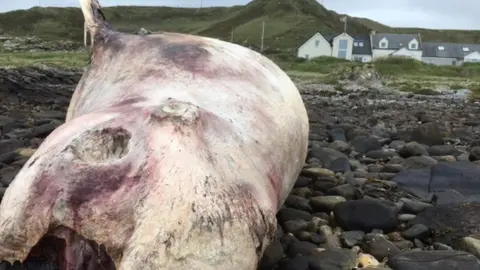 SMASS
SMASS
The UK military has been asked for its activities in the area but it is not as easy to get information from other agencies within Nato or foreign navies.
Dr Brownlow said: "For example if the Russian Navy have decided to come down to the eastern Atlantic then that information about what they've been doing is unlikely to ever be made available to us."
What does the Royal Navy say?
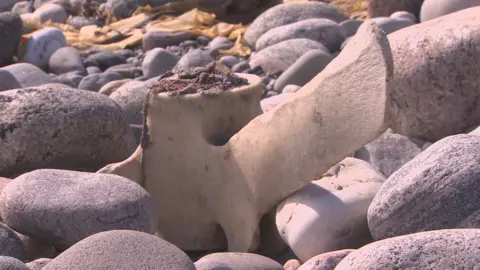
A spokeswoman for the MoD said: "The Royal Navy takes its responsibilities in safeguarding the environment very seriously and, when at all possible, operators take avoidance actions should animals be detected before or during sonar operations.
"Our precautionary practices are similar to those used in other marine industries and are regularly reviewed by statutory bodies to ensure they reflect the latest understanding of the marine environment and the effects of sound on it.
"To remain effective elements of UK defence, Royal Navy units need to operate flexibly in locations around the UK and the world."
Has this happened before?
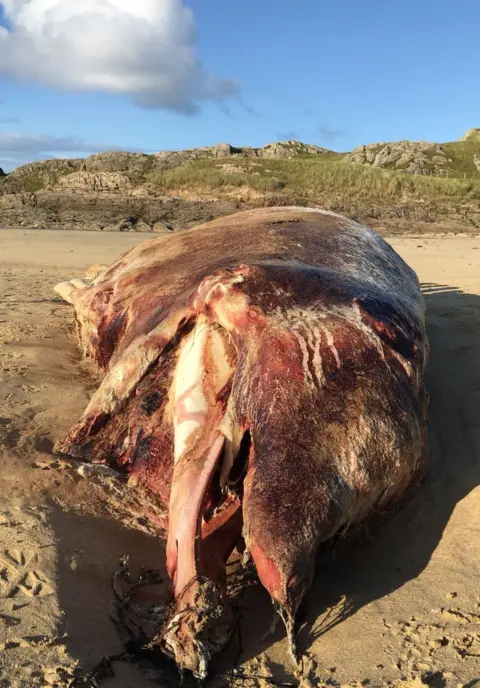 SMASS
SMASS
Prof Tyack said one of the best known cases was noticed off the Canary Islands.
A Spanish biologist studied some of the animals that stranded alive and found they had both gas bubbles and fat had embolised in the body - that is consistent with decompression sickness.
Prof Tyack said the animals were diving under deep pressure and they must have suddenly come to a lower pressure near the surface and that caused bubbles to form which - just like in human divers - can be lethal.
He said: "These animals probably died at sea and there's been one case in the Canaries where a whale washed ashore about a week or two after a sonar exercise and they were too decayed to see the air bubbles - but you could see other signs that indicate decompression sickness.
"So that suggests what could happen here is the animals close to the exercise and far from the shore, might have disrupted their diving, got decompression, died, floated to the surface and then some of them washed ashore."
What can be done?
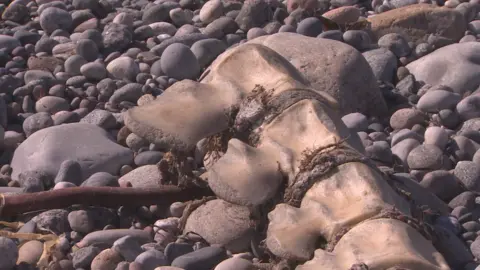
Prof Tyack said the response of the Canaries strandings was to ban sonar within 50 nautical miles of the coast.
He said that in the US they conduct sonar exercises on underwater ranges where they can track the location of the whales and very few exercises or training exercises have been associated with any problem when they occur in this kind of setting.
The Scottish and UK governments have ordered an investigation.
